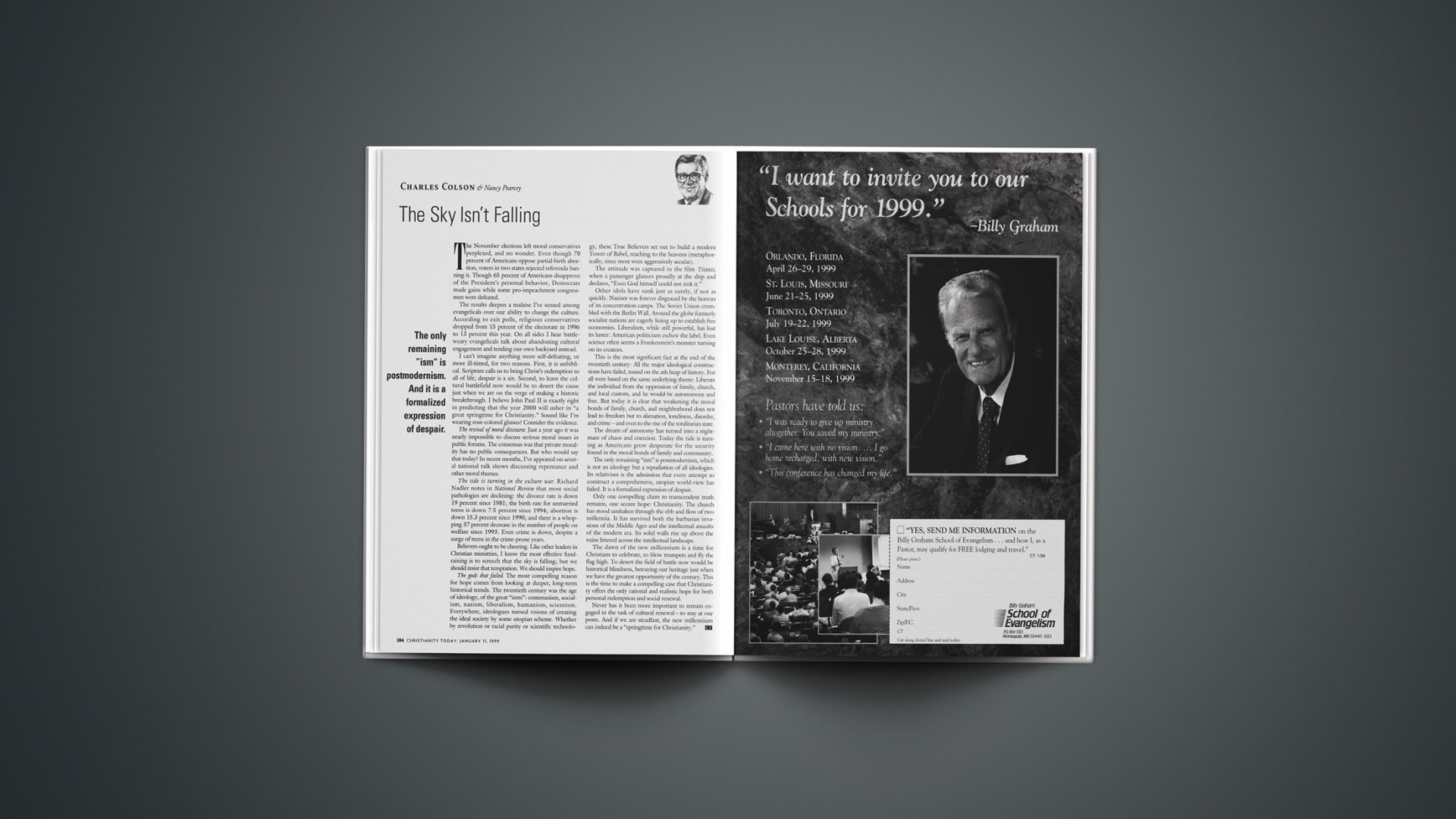The November elections left moral conservatives perplexed, and no wonder. Even though 70 percent of Americans oppose partial-birth abortion, voters in two states rejected referenda banning it. Though 65 percent of Americans disapprove of the President’s personal behavior, Democrats made gains while some pro-impeachment congressmen were defeated.
The results deepen a malaise I’ve sensed among evangelicals over our ability to change the culture. According to exit polls, religious conservatives dropped from 15 percent of the electorate in 1996 to 13 percent this year. On all sides I hear battle-weary evangelicals talk about abandoning cultural engagement and tending our own backyard instead.
I can’t imagine anything more self-defeating, or more ill-timed, for two reasons. First, it is unbiblical. Scripture calls us to bring Christ’s redemption to all of life; despair is a sin. Second, to leave the cultural battlefield now would be to desert the cause just when we are on the verge of making a historic breakthrough. I believe John Paul II is exactly right in predicting that the year 2000 will usher in “a great springtime for Christianity.” Sound like I’m wearing rose-colored glasses? Consider the evidence.
The revival of moral discourse. Just a year ago it was nearly impossible to discuss serious moral issues in public forums. The consensus was that private morality has no public consequences. But who would say that today? In recent months, I’ve appeared on several national talk shows discussing repentance and other moral themes.
The tide is turning in the culture war. Richard Nadler notes in National Review that most social pathologies are declining: the divorce rate is down 19 percent since 1981; the birth rate for unmarried teens is down 7.5 percent since 1994; abortion is down 15.3 percent since 1990; and there is a whopping 37 percent decrease in the number of people on welfare since 1993. Even crime is down, despite a surge of teens in the crime-prone years.
Believers ought to be cheering. Like other leaders in Christian ministries, I know the most effective fundraising is to screech that the sky is falling; but we should resist that temptation. We should inspire hope.
The gods that failed. The most compelling reason for hope comes from looking at deeper, long-term historical trends. The twentieth century was the age of ideology, of the great “isms”: communism, socialism, nazism, liberalism, humanism, scientism. Everywhere, ideologues nursed visions of creating the ideal society by some utopian scheme. Whether by revolution or racial purity or scientific technology, these True Believers set out to build a modern Tower of Babel, reaching to the heavens (metaphorically, since most were aggressively secular).
The attitude was captured in the film Titanic, when a passenger glances proudly at the ship and declares, “Even God himself could not sink it.”
Other idols have sunk just as surely, if not as quickly. Nazism was forever disgraced by the horrors of its concentration camps. The Soviet Union crumbled with the Berlin Wall. Around the globe formerly socialist nations are eagerly lining up to establish free economies. Liberalism, while still powerful, has lost its luster: American politicians eschew the label. Even science often seems a Frankenstein’s monster turning on its creators.
This is the most significant fact at the end of the twentieth century: All the major ideological constructions have failed, tossed on the ash heap of history. For all were based on the same underlying theme: Liberate the individual from the oppression of family, church, and local custom, and he would be autonomous and free. But today it is clear that weakening the moral bonds of family, church, and neighborhood does not lead to freedom but to alienation, loneliness, disorder, and crime—and even to the rise of the totalitarian state.
The dream of autonomy has turned into a nightmare of chaos and coercion. Today the tide is turning as Americans grow desperate for the security found in the moral bonds of family and community.
The only remaining “ism” is postmodernism, which is not an ideology but a repudiation of all ideologies. Its relativism is the admission that every attempt to construct a comprehensive, utopian world-view has failed. It is a formalized expression of despair.
Only one compelling claim to transcendent truth remains, one secure hope: Christianity. The church has stood unshaken through the ebb and flow of two millennia. It has survived both the barbarian invasions of the Middle Ages and the intellectual assaults of the modern era. Its solid walls rise up above the ruins littered across the intellectual landscape.
The dawn of the new millennium is a time for Christians to celebrate, to blow trumpets and fly the flag high. To desert the field of battle now would be historical blindness, betraying our heritage just when we have the greatest opportunity of the century. This is the time to make a compelling case that Christianity offers the only rational and realistic hope for both personal redemption and social renewal.
Never has it been more important to remain engaged in the task of cultural renewal—to stay at our posts. And if we are steadfast, the new millennium can indeed be a “springtime for Christianity.”
Copyright © 1999 Christianity Today. Click for reprint information.










